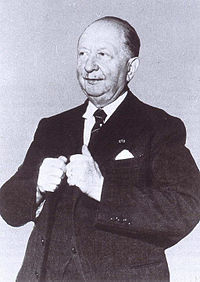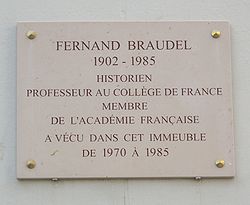Annales School
The Annales School is a historiographical current founded by Lucien Febvre and Marc Bloch in 1929, which has dominated practically all French historiography of the XX and has had a huge spread in the Western world. It is named after the French magazine Annales d'histoire économique et sociale (later renamed Annales. Economies, sociétés, civilizations, and renamed again in 1994 as Annales. Histoire, Sciences sociales), where his ideas were first published.
The “Corrente de los Annales” develops a history that is not interested in the political event and the individual as the protagonist, typical of the work of contemporary Historiography, but in the processes, the social structures and, later, by a wide range of topics whose approach with the methodological tools of the Social Sciences allowed him to study.
The historian in this current adheres to a way of writing history from the point of view of problems to be solved or questions to be answered, a position inherited from the exact natural sciences and, secondly, from the social ones. In addition, unlike classical historiography, these authors are aware that they are not writing about the past, faithfully reproducing it, but rather interpreting it, based on their own concepts and subjectivity, as well as theories, to write their version of the historical phenomenon on which who work
Regarding sources, Annales broadened the range of resources that are legitimately available. Although the written documents continue to be a very important element in its empirical base, all those elements that could provide useful evidence in the investigation were included. Thus, the sickle speaks of the peasant, the dress - of the lady or the accordion - of the musician.
Geographical, social, economic, cultural, demographic, psychological, ethnographic, and political history was produced, but the latter in a different from the classical sense.
The Annales Current is of transcendence for the analysis of studies in the social sciences developed in the XX century and it left the way open for a great variety of methodologies and approaches to appear within the discipline of history. By the end of the century, this disciplinary atomization would result in an important methodological and epistemological conflict and in the crisis of postmodern criticism.
Birth
The magazine Annales was founded and edited by French historians Marc Bloch and Lucien Febvre in 1929, while they were teaching at the University of Strasbourg. The publication proposed a conception of historical research different from that which had preceded it, since it combined the geography, history and sociological approaches of the Année Sociologique (where many of Bloch's and Febvre's colleagues wrote in Strasbourg); In addition, he advocated an expansion in the subjects of study of History, and rejected the predominant emphasis on politics, diplomacy, and war events, approaches to which many of the historians of the XIX.
Despite the desire for renewal that the magazine sought, the efforts of its editors had to wait until the end of World War II. Bloch, a member of the French Resistance and a Jew, was tortured and murdered by members of the Gestapo, and Febvre continued to publish the Annales in the 1940s. During those years he taught Fernand Braudel, who would become one of the most renowned exponents of this school.
Braudel's time
The work of Fernand Braudel defined a “second generation” in the historiography of the Annales, which was highly influential throughout the 1960s. Braudel innovated the field of history by introducing, in the explanation of historical facts, the "durations" (short, medium and long duration). Among his works it is worth mentioning The Mediterranean and the Mediterranean world in the time of Felipe II , published in 1949, and framed in a strong structuralist disposition.
After reading his thesis The Mediterranean and the Mediterranean world in the time of Felipe II in 1945, Fernand Braudel became the highest representative of the current and the strongest candidate for the succession of a Febvre who until his death in 1956 continued to be its leader. In 1949 he was elected as professor at the Collège de France (College of France) and in 1956 he succeeds Febvre. Given the progressive consolidation of his power, voluntary splits (Mandrou, Morenze) and purges such as the one he carried out in 1969 on the editorial committee, and imposed on his most loyal disciples, such as Marc Ferro or Jacques Le Goff. He will progressively take control of the French scholarships and some international scholarships, consolidating his academic hegemony in France and an empire based on international satellites and the patronage of the Rockefeller Foundation.
The methodology offered by Fernand Braudel to consolidate what was proposed by Febvre will be based on the integration of space and geopolitics in the historical discourse; from which he configures a functionalist discourse in which the role of the individual is reduced to the minimum possible. In this sense, if we want to understand Braudel's thought we must focus on his two fundamental works, The Mediterranean and the Mediterranean world in the time of Felipe II and Civilización material, economía y capitalismo (XVI -XVIII).
For Alain Guerreau, Braudel provides a way out of the plight of abandoning theory with his "three-stroke engine." In The Mediterranean, Braudel devised a structure characterized by its different rates of evolution. At the base of it would be the "geohistory", the relationship of man with the environment that surrounds him. Then, the social structure of the "collective destinies and joint movements", subdivided into economies, empires, civilizations, societies and forms of war. Finally, Braudel situates "events, politics and men" as the foam of the waves that crash against the rock of the structures. The problem with this structuring is the fact that it creates a holistic scheme in which we find no causal relationship between its parts. By framing everything in a deterministic explanation, he barely provides data on the transition from feudalism to capitalism.
On the other hand, in 1979 he would publish Material civilization, economy and capitalism (XVI-XVIII). In this work, Braudel would carry out a methodological renewal, largely influenced by the theories of Immanuel Wallerstein. Here, Braudel is going to structure the work in relation to the diverse characterization of economic activities, although he continues to do so from a triune scheme. This division will be characterized by the base or "material civilization", where all the base activity that escapes the market is located, the "economy" itself, which is analyzed from the perspective of perfect competition and market regularity, and a third area where the game of "active social hierarchies" operates, monopoly and privilege, which for Braudel is that of a "capitalism" that escapes the rules of the market and is synonymous with speculation. By focusing on social relations from the mercantile sphere, he ignores relations of order or hierarchy and vassalage, displacing relations of exploitation from his analysis.
In this way, Fernand Braudel faces the task of bringing coherence to Febvre's functionalist heritage, assuming the inevitability of structures. Despite this, Annales maintained the rigor and demand that had characterized her. When the transition to the third generation arrives, the risks of abandoning the theory will be demonstrated and what François Dosse has called “crumbling” will take place.
The third generation
At the beginning of the 1970s, Braudel withdrew from Annales due to internal disagreements. With his departure, he distinguishes himself from a third generation that is characterized by its heterogeneity, where there is no methodological, political or intellectual consensus. However, some features can be highlighted: the increase in academic and social presence and interest in studying culture. His sources of inspiration are Lucien Febvre, Jules Michelet and Michel Foucault. These historians, headed by Jacques Le Goff and Pierre Nora, invented a term, "The New History", to classify their own production, in an attempt to mark the historiographic novelty that they implied. According to Le Goff, the New History was born to answer new questions to a broader public, internalizing the methods of anthropology. Now there is an interest in the event, in political history, the rediscovery of the history of mentalities and representations, in total history.
They received criticism for their "discrumbling," that is, the disorderly multiplication of research objects.
The fourth generation: The critical turn
In this context of crisis, Lepetit, as secretary of the publication, launched an editorial in the spring of 1988 announcing this new twist. Today, the historian Roger Chartier is known as the most important representative of the fourth generation of the Annales.
Historiographical works by members of the Annales
- Bloch, Marc. How and why the ancient slavery endedin AAVV The Transition of Mamalism".
- Bloch, Marc. History and historians.
- Bloch, Marc. French rural history. Original characters.
- Bloch, Marc. Introduction to History (Original title) Apologie pour l ́histoire ou Métier d ́Historien).
- Bloch, Marc. feudal society.
- Bloch, Marc. The strange defeat.
- Bloch, Marc. Taumatur kings.
- Braudel, Fernand. Material Civilization, Economy and Capitalism. XV-XVIII century.
- Braudel, Fernand. The Mediterranean and the Mediterranean world at the time of Philip II.
- Braudel, Fernand. Writings about History.
- Braudel, Fernand. History and Social Sciences.
- Braudel, Fernand. Current civilizations. Study of Economic and Social History.
- Duby, Georges. Art and society in the Middle Ages.
- Duby, Georges. The year a thousand.
- Duby, Georges. On Bouvines Sunday.
- Duby, Georges. Warriors and peasants. Initial development of the European economy (500-1200).
- Duby, Georges. Men and structures of the Middle Ages.
- Duby, Georges. History continues.
- Duby, Georges. San Bernardo and Cisterciense Art (The Birth of the Gothic).
- Duby, Georges; Lardreau, Guy. Dialogues on History.
- Febvre, Lucien. Fighting for history.
- Febvre, Lucien. The earth and human evolution.
- Le Goff, Jacques (in collaboration with Revel, Jacques). The new story.
- Le Goff, Jacques; Nora, Pierre. Make history.


